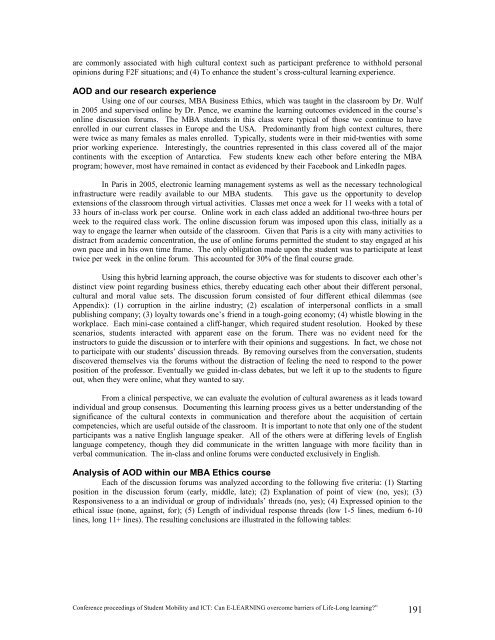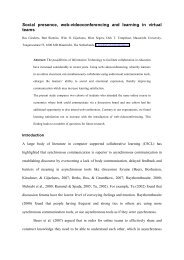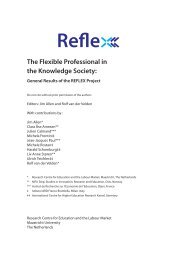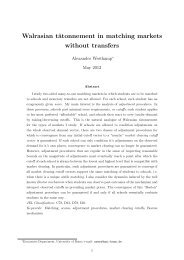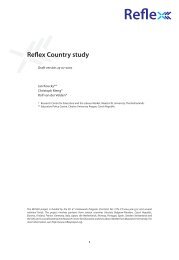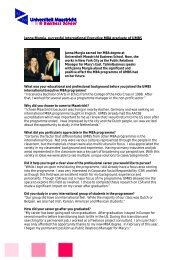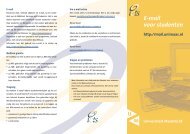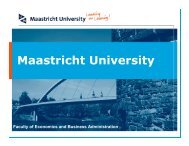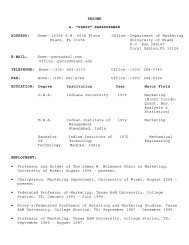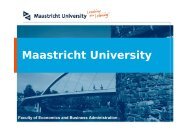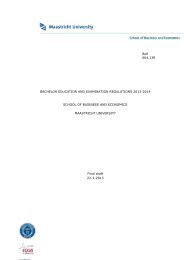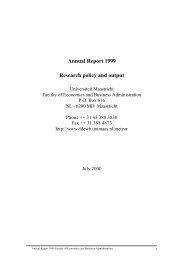proceedings of Student Mobility and ICT: Can E-LEARNING
proceedings of Student Mobility and ICT: Can E-LEARNING
proceedings of Student Mobility and ICT: Can E-LEARNING
You also want an ePaper? Increase the reach of your titles
YUMPU automatically turns print PDFs into web optimized ePapers that Google loves.
are commonly associated with high cultural context such as participant preference to withhold personal<br />
opinions during F2F situations; <strong>and</strong> (4) To enhance the student’s cross-cultural learning experience.<br />
AOD <strong>and</strong> our research experience<br />
Using one <strong>of</strong> our courses, MBA Business Ethics, which was taught in the classroom by Dr. Wulf<br />
in 2005 <strong>and</strong> supervised online by Dr. Pence, we examine the learning outcomes evidenced in the course’s<br />
online discussion forums. The MBA students in this class were typical <strong>of</strong> those we continue to have<br />
enrolled in our current classes in Europe <strong>and</strong> the USA. Predominantly from high context cultures, there<br />
were twice as many females as males enrolled. Typically, students were in their mid-twenties with some<br />
prior working experience. Interestingly, the countries represented in this class covered all <strong>of</strong> the major<br />
continents with the exception <strong>of</strong> Antarctica. Few students knew each other before entering the MBA<br />
program; however, most have remained in contact as evidenced by their Facebook <strong>and</strong> LinkedIn pages.<br />
In Paris in 2005, electronic learning management systems as well as the necessary technological<br />
infrastructure were readily available to our MBA students. This gave us the opportunity to develop<br />
extensions <strong>of</strong> the classroom through virtual activities. Classes met once a week for 11 weeks with a total <strong>of</strong><br />
33 hours <strong>of</strong> in-class work per course. Online work in each class added an additional two-three hours per<br />
week to the required class work. The online discussion forum was imposed upon this class, initially as a<br />
way to engage the learner when outside <strong>of</strong> the classroom. Given that Paris is a city with many activities to<br />
distract from academic concentration, the use <strong>of</strong> online forums permitted the student to stay engaged at his<br />
own pace <strong>and</strong> in his own time frame. The only obligation made upon the student was to participate at least<br />
twice per week in the online forum. This accounted for 30% <strong>of</strong> the final course grade.<br />
Using this hybrid learning approach, the course objective was for students to discover each other’s<br />
distinct view point regarding business ethics, thereby educating each other about their different personal,<br />
cultural <strong>and</strong> moral value sets. The discussion forum consisted <strong>of</strong> four different ethical dilemmas (see<br />
Appendix): (1) corruption in the airline industry; (2) escalation <strong>of</strong> interpersonal conflicts in a small<br />
publishing company; (3) loyalty towards one’s friend in a tough-going economy; (4) whistle blowing in the<br />
workplace. Each mini-case contained a cliff-hanger, which required student resolution. Hooked by these<br />
scenarios, students interacted with apparent ease on the forum. There was no evident need for the<br />
instructors to guide the discussion or to interfere with their opinions <strong>and</strong> suggestions. In fact, we chose not<br />
to participate with our students’ discussion threads. By removing ourselves from the conversation, students<br />
discovered themselves via the forums without the distraction <strong>of</strong> feeling the need to respond to the power<br />
position <strong>of</strong> the pr<strong>of</strong>essor. Eventually we guided in-class debates, but we left it up to the students to figure<br />
out, when they were online, what they wanted to say.<br />
From a clinical perspective, we can evaluate the evolution <strong>of</strong> cultural awareness as it leads toward<br />
individual <strong>and</strong> group consensus. Documenting this learning process gives us a better underst<strong>and</strong>ing <strong>of</strong> the<br />
significance <strong>of</strong> the cultural contexts in communication <strong>and</strong> therefore about the acquisition <strong>of</strong> certain<br />
competencies, which are useful outside <strong>of</strong> the classroom. It is important to note that only one <strong>of</strong> the student<br />
participants was a native English language speaker. All <strong>of</strong> the others were at differing levels <strong>of</strong> English<br />
language competency, though they did communicate in the written language with more facility than in<br />
verbal communication. The in-class <strong>and</strong> online forums were conducted exclusively in English.<br />
Analysis <strong>of</strong> AOD within our MBA Ethics course<br />
Each <strong>of</strong> the discussion forums was analyzed according to the following five criteria: (1) Starting<br />
position in the discussion forum (early, middle, late); (2) Explanation <strong>of</strong> point <strong>of</strong> view (no, yes); (3)<br />
Responsiveness to a an individual or group <strong>of</strong> individuals’ threads (no, yes); (4) Expressed opinion to the<br />
ethical issue (none, against, for); (5) Length <strong>of</strong> individual response threads (low 1-5 lines, medium 6-10<br />
lines, long 11+ lines). The resulting conclusions are illustrated in the following tables:<br />
Conference <strong>proceedings</strong> <strong>of</strong> <strong>Student</strong> <strong>Mobility</strong> <strong>and</strong> <strong>ICT</strong>: <strong>Can</strong> E-<strong>LEARNING</strong> overcome barriers <strong>of</strong> Life-Long learning?” 191


